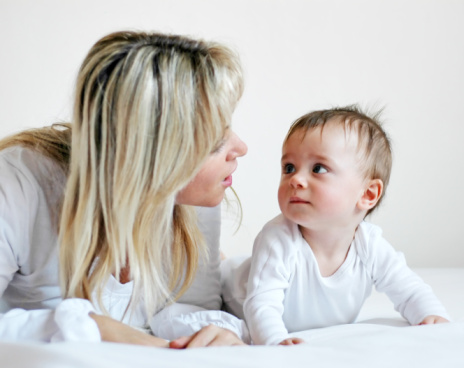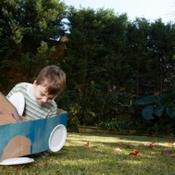 I’m constantly amazed when I witness other parents making assumptions that because their young children cannot yet talk or clearly express their needs, they must not be able to understand much. A friend recently voiced frustration because her 1-year-old son won’t give up his pacifier. I said, “Why don’t you explain to him that he’s older now and it’s time to put them away?” She looked appalled and said, “He is not going to understand that!” I silently disagreed, believing children are more perceptive than they are often given credit for.
I’m constantly amazed when I witness other parents making assumptions that because their young children cannot yet talk or clearly express their needs, they must not be able to understand much. A friend recently voiced frustration because her 1-year-old son won’t give up his pacifier. I said, “Why don’t you explain to him that he’s older now and it’s time to put them away?” She looked appalled and said, “He is not going to understand that!” I silently disagreed, believing children are more perceptive than they are often given credit for.
Very young children may be unable to speak, but they are always listening and observing. The way you communicate with your child helps form the foundations of their understanding of the world around them. By nature, we all tend to do better, have lower anxiety levels, and increase our performance when we know what to anticipate and are clear on what is expected of us. The same is true for children, even toddlers and young babies.
My personal belief is that babies comprehend what we say very early on. I’ve always found talking to my babies with the assumption they are capable of understanding everything, despite their inability to respond, helped make life more peaceful. When sleep deprivation caught up with me with a newborn, I told my baby, “I’m really tired and I need you to please sleep all night so I can have more energy during the day.” Before going out to dinner, I’d lecture my 6-month-old on the importance of being quiet so other people around us could enjoy their meals. And whenever we’d go somewhere new, I’d spend the car ride explaining exactly what was going to happen, even if it was something unpleasant like getting a shot at the doctor’s office. I really believe part of my luck in getting my kids to meet my needs is my habit of talking to them and explaining every little mundane thing so they know exactly what to expect and what is expected of them.
This may sound crazy, but I’m always impressed at how their actions tend to live up to my requests when I’ve taken the time to have these “chats.” I know there are a lot of parents out there who subscribe to the “don’t tell them about the shot” and “no use getting them anxious” method, and for certain kids this may be necessary. But I’ve found things go more smoothly when I’ve taken the time to talk to my young children the same way I would to an older person capable of having conversations. I believe being very clear with kids helps them to learn, trust, and adapt to various situations with greater ease.
Of course, much of this is easier said than done. I find it harder to practice what I preach with my second child because I’m busier and pulled in more directions, thus I don’t always have the extra time to stop and thoroughly explain things. It’s easy to forget how important it is to explain and set clear expectations when I am busy or tired.
Take potty training, for example. I had a few feeble attempts at potty training with my daughter. She could do it if we put her on the potty, but didn’t seem able to go diaper free. Then I realized I hadn’t truly explained to her no longer wearing diapers was part of the goal. So I sat her down on Christmas Eve and explained to her that she was going to wear underwear and use the potty every day from now on. I told her Santa would be taking her diapers back to the North Pole with him. Knowing kids are especially attentive during times you don’t think they are paying attention, I staged a phone call to an “elf” to confirm the diaper pick-up when she was in earshot. Understanding exactly what the plan was, she was potty trained within a week.
I’ve found that things go more smoothly when I’ve taken the time to talk to my young children the same way I would to an older person capable of having conversations. I believe being very clear with kids helps them to learn, trust, and adapt to various situations with greater ease.
While a lot of what I talk to my daughter about is intentional, explaining and setting expectations, much of it involves me simply babbling away about random things in an attempt to distract her from the inevitable meltdown that might otherwise occur if she focused on the fact I was changing her out of her favorite shirt or failing to bring her favorite object of the moment into the car with us. Through my ramblings, she is learning what, to her, are interesting things about the world and how things work. I’m constantly fascinated by the words and concepts she remembers and later repeats, and family members have been impressed by her large vocabulary at an early age, including terms such as smoke detector, dimmer switch, and spatula.
Recently, while my mom drove us to the airport, I was explaining to my daughter what was going to happen when we got there. I explained we were going to go through the security check and she needed to cooperate so we could hurry and not miss our flight. I talked about the ticket agents, the baggage check, the metal detectors, and the jet way. My daughter was silent, and my mom rolled her eyes and remarked, “She is B-O-R-E-D.” But a few minutes later my daughter said, “I think I saw the security check on Peppa Pig.” This reaffirmed my belief that children are always listening, thinking, and absorbing.
Studies published in the Proceedings of the National Academy of Sciences indicate language learning begins in the womb. By six to nine months of age, infants tend to know the meaning of common nouns. Additionally, children are quite perceptive to tone, body language, and facial expressions. So take notice of how and when you are talking to and interacting with your kids. You may discover there are many overlooked opportunities to encourage them to learn and grow.
References:
- Bergelson, E., & Swingley, D. (2011). At 6-9 months, human infants know the meaning of many common nouns. Proceedings of the National Academy of Sciences, 109(9), 3,253-3,258.
- Partanen, E., Kujala, T., Naatanen, R. Liitola, A., Sambeth, A., & Huotilainen, M. (2013). Learning-induced neural plasticity of speech processing before birth. Proceedings of the National Academy of Sciences, 110(37), 15,145-15,150.
© Copyright 2016 GoodTherapy.org. All rights reserved. Permission to publish granted by Megan MacCutcheon, LPC, GoodTherapy.org Topic Expert Contributor
The preceding article was solely written by the author named above. Any views and opinions expressed are not necessarily shared by GoodTherapy.org. Questions or concerns about the preceding article can be directed to the author or posted as a comment below.

 Learning Through Play: The World as Your Child's Classroom
Learning Through Play: The World as Your Child's Classroom Does Your Child Have a Substance Abuse Problem?
Does Your Child Have a Substance Abuse Problem? Chronic Pain in Children: What’s a Parent to Do?
Chronic Pain in Children: What’s a Parent to Do?